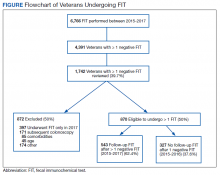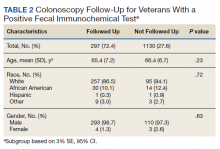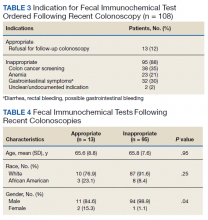High Rate of Inappropriate Fecal Immunochemical Testing at a Large Veterans Affairs Health Care System
Introduction: Colonoscopies and fecal immunochemical tests (FITs) are the preferred modalities for colorectal cancer (CRC) screening. In addition to proper patient selection, appropriate fecal immunochemical testing requires that negative tests be repeated annually, positive tests lead to a diagnostic colonoscopy, and FIT not be performed within 5 years of a colonoscopy with adequate bowel preparation. We sought to study the frequency of inappropriate FITs at the Veterans Affairs Pittsburgh Health Care System in Pennsylvania.
Methods: A retrospective quality assurance study was undertaken of veterans undergoing FIT in a 3-year period (2015-2017). We calculated the rate of a negative initial FIT in 2015/2016 followed by a second FIT in 2016/2017 in a random selection of veterans (3% SE, 95% CI). Demographics were compared in an equal random number of veterans that did and did not have a follow-up FIT (5% SE, 95% CI of all negative FIT). We also calculated the rate of completing colonoscopy following a positive FIT in a random selection of veterans (3% SE, 95% CI). Finally, we investigated use of FIT following a colonoscopy for all veterans in the study period.
Results: A total of 6,766 FITs were performed; 4,391 unique veterans had at least 1 negative FIT, and 709 unique veterans had a positive FIT. Of 1,742 veterans with at least 1 negative FIT, 870 were eligible for repeat testing during the study period, and only 543 (62.4%) underwent at least 2 FITs. There was no significant demographic difference in veterans that had only 1 or at least 2 FITs. Of 410 veterans with a positive FIT, 113 (27.5%) did not undergo a subsequent colonoscopy within 1 year due to patient refusal, or failure to schedule or keep a colonoscopy appointment. Of 832 veterans who had both a FIT and colonoscopy in the interval, 108 veterans underwent colonoscopy with a subsequent FIT (1.6% of total FITs performed). Of these, 95 (88%) were judged to be inappropriate. Thirteen instances of FIT following colonoscopy were appropriate based on patient preference to undergo fecal immunochemical testing for CRC screening modality after undergoing colonoscopy with an inadequate bowel preparation.
Conclusions: Veterans underwent inappropriate testing due to failure to undergo serial FIT after a negative result (37.6%), failure to complete colonoscopy following a positive FIT (27.5%), and undergoing inappropriate FIT following a recent colonoscopy (88%). Efforts are still required to improve both patient and provider education and adherence to appropriate fecal immunochemical testing and CRC screening guidelines.
We made 3 calculations for this study. First, we measured the rate of a negative initial FIT in 2015 and/or 2016 followed by a second FIT in 2016 and/or 2017 in a random selection of veterans (3% SE, 95% CI). Demographics were compared in an equal random number of veterans who did and did not have a follow up FIT (5% SE, 95% CI of all negative FIT). Second, we measured the rate of completing colonoscopy following a positive FIT in a random selection of veterans (3% SE, 95% SI). Finally, we calculated FITs following a colonoscopy for all veterans.
Using a power analysis with a 3% SE and 95% CI for sample size calculation and accounting for the approximate 50% exclusion rate from the final eligible population of veterans with at least 1 negative FIT, a random sample of 1,742 patient charts with a negative FIT in the interval were then reviewed to determine the frequency with which they underwent multiple FITs in the interval as well as for the presence of exclusionary factors. Because of the large number of veterans involved in this category, a more detailed demographics review was performed of a subset of these patients using a 95% CI and 5% SE. Using a 95% CI and 3% SE, 445 veterans with a positive FIT in the interval were reviewed to determine the frequency at which they underwent a follow-up diagnostic colonoscopy.
Because of a relatively small sample size, all 108 veterans who underwent a colonoscopy followed by a FIT were reviewed to determine the reason for follow-up FIT. In addition, in veterans who then went on to have a subsequent repeat colonoscopy, the examination findings were recorded.
Results
From January 1, 2015 to December 31, 2017, 6,766 FIT, were ordered at VAPHS. Of these, 4,391 unique veterans had at least 1 negative FIT during the period and 709 unique veterans had a positive FIT. There were 832 veterans who had both a FIT and colonoscopy during the study period. Of these, 108 had a colonoscopy with a subsequent FIT (Figure).
Of 1,742 randomly selected veterans with at least 1 negative FIT in the study interval, 870 were eligible for multiple FITs during this period as they were in the appropriate screening age (50-75 years or 85 years based on an assessment of life expectancy by the ordering health care provider [HCP]), did not have exclusionary comorbidities to multiple FIT, were not lost to follow-up, and had at least 1 negative FIT collected from 2015 to 2016 (veterans who only had a FIT in 2017 were excluded from this aim to avoid confounding). Of these 870 veterans, 543 (62.4%) underwent at least 2 FITs during the study period. In a demographic comparison of 110 veterans with 1 FIT and 110 veterans with > 1 FIT, there were no statistically significant differences in demographics (Table 1).
In a random chart review of 410 veterans with a positive FIT, 113 (27.5%) veterans did not undergo a subsequent colonoscopy within 1 year due to patient refusal, failure to schedule, or failure to keep colonoscopy appointment. There were no differences in demographics between those that underwent a diagnostic colonoscopy and those that did not (Table 2).
Of the 108 patients with a FIT following colonoscopy in the study interval, 97 FITs were negative. Ninety-five of the 108 FITs (88%) were judged to be inappropriate, having been performed for indications, including 38 for colon cancer screening, 23 for anemia, 32 for GI symptoms (eg, diarrhea, rectal bleeding, possible GI bleeding), and 2 for unclear indications. Thirteen FITs were deemed appropriate, as they were performed on veterans who refused to have a repeat colonoscopy following an examination with inadequate bowel preparation (Table 3). There was no difference in age or race between these 2 groups, although there was a statistically significant difference in gender (Table 4).
There were 19 patients who had a colonoscopy following a prior colonoscopy and subsequent positive FIT in the interval. Eight patients had no significant findings, 10 had nonadvanced adenomas, and 1 had an advanced adenoma (this patient had inadequate preparation with recommendation to repeat colonoscopy in 1 year).










